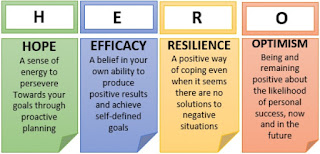Positive psychology developed out of the work of Martin Seligman in the 1970s and 1980s. One person describes positive psychology as “the scientific study of what makes life most worth living.” Rather than studying the pathology of those who have problems coping with everyday life, those involved in positive psychology look at how individuals not only cope but prosper.”
In recent years, positive organizational psychology has evolved to study what both elevates and challenges employees and their companies. It proposes that we ask questions about what goes right, what gives life, what inspires and what is experienced as good, in addition to what is problematic and difficult in organizations. This type of research addresses topics such as hope, efficacy, resilience, and optimism.
Of course, an organization that is characterized by the elements of positive psychology are its leaders. One research project identified these four characteristics as key attributes of such a leader:
- Hope--being proactive in pursuing one’s goals in all circumstances. This is what Angela Duckworth calls “grit”--having the passion to persevere in pursuing a goal.
- Efficacy--a belief in oneself and one’s ability to achieve, something which Carol Dweck addresses in her book Mindset: The New Psychology of Success.
- Resilience--the ability to bounce back under difficult circumstances, a topic addressed by Sheryl Sandberg and Adam Grant in Option B: Facing Adversity, Building Resilience, and Finding Joy.
- Optimism--having and retaining a positive attitude in the present and as one looks toward the future. This was addressed by Seligman in his seminal book, Learned Optimism: How to Change Your Mind and Your Life.
Although some may argue that this is a humanistic approach to organizational development and leadership, I would suggest approaching this through the lens of a Christian worldview. If you believe that God only wants the best for those who follow God and wishes for them to maximize their gifts and potential, you have a solid foundation upon which to understand and apply these concepts. Although we lack perfection, those who have embraced the Christian faith have started down a path of growth and self-actualization.
The primary distinction that a Christian brings to positive psychology and positive organizational psychology is that we understand that anything we create will never be perfect, but we can use our God-given gifts and abilities to work for ongoing improvement in this life for the benefit of ourselves and others.
To broaden your leadership skills and your own personal development, I recommend the resources listed above and this site.


Comments